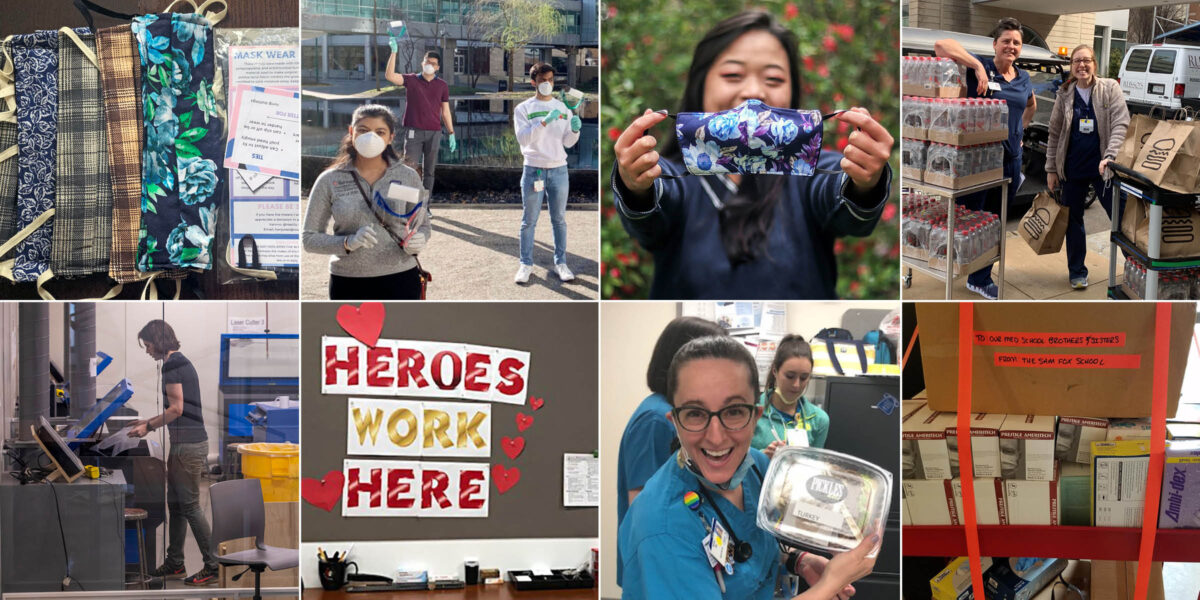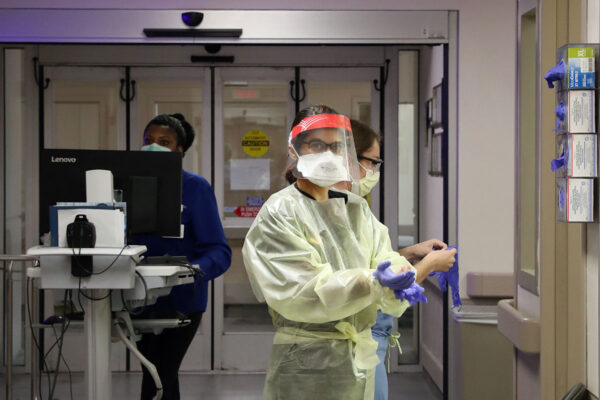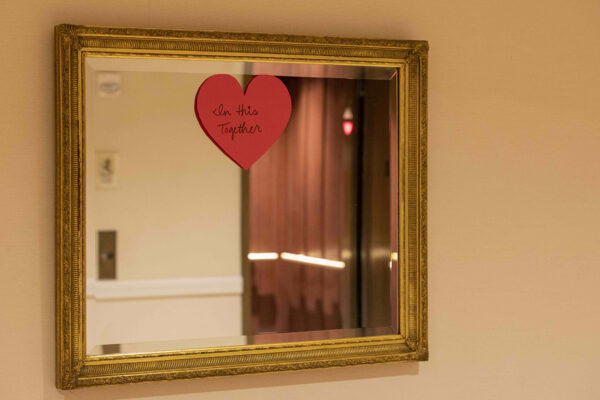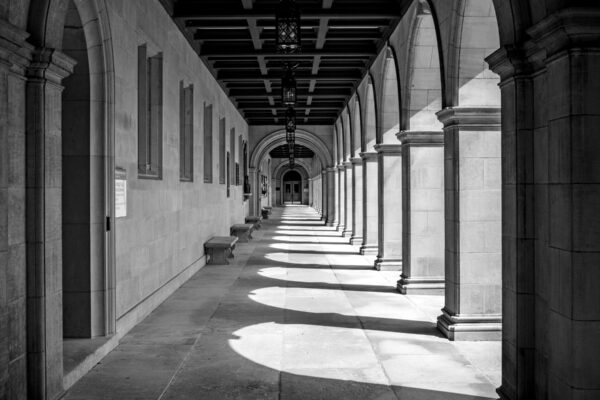As Washington University in St. Louis researchers and physicians join the fight to halt COVID-19’s proliferation across the globe, our staff, students, doctors and alumni are working tirelessly to care for the St. Louis community we call home.
“From the physicians on the frontlines to the researchers tracking the virus to the faculty members who are helping businesses and nonprofits stay afloat, our community is showing up every day with compassion, commitment and ingenuity,” said Chancellor Andrew D. Martin. “I am especially moved by the can-do spirit of our students who have launched organizations to tutor local students, deliver meals, provide child care and reach out to isolated seniors.”
Caring for the sick, caring for one another
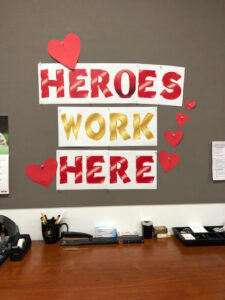
Washington University’s effort to help the St. Louis community starts with the more than 1,700 primary care and specialist physicians of the School of Medicine. Many already are treating confirmed cases of COVID-19 while others are volunteering to take on new clinical roles as cases continue to mount.
“We surveyed our faculty members and the response was breathtaking, with more than 700 faculty members willing to step outside their regular areas of practice to help where they are most needed,” said David H. Perlmutter, MD, executive vice chancellor for medical affairs and the George and Carol Bauer Dean of the School of Medicine. Since then, he added, “even more members of the faculty have stepped up, volunteering to potentially cover different units in the hospital, ambulatory clinics and/or the emergency department when needed.”
Scores of students on the Washington University Medical Campus have mobilized to support their faculty mentors. They are reviewing emerging academic research on COVID-19 to save care providers valuable time; managing a coronavirus email “hotline”; and providing child care to health-care workers. They also have manufactured more than 1,600 face shields and soon will deliver meals to infected and at-risk community members through St. Louis Food Angels, an affiliate of Sling Health.
Haley Sherburne, a first-year medical student interested in pediatrics, is among the 170 students who have volunteered to provide child care.
“I’m just beginning my journey as a clinician and cannot actively participate in the treatment of those affected by COVID-19,” said Sherburne, whose child-care experience includes working with terminally ill children as well as those with cognitive and physical disabilities. “But I can help health-care workers serve the urgent needs of our patients, knowing that their children are safe and cared for by capable and compassionate volunteers.”
The Danforth Campus’ Charles F. Knight Executive Education and Conference Center, which isn’t open to regular guests at this time, is providing rooms and meals to health-care providers who don’t want to return home between shifts, either to avoid the risk of spreading the virus to their families or due to travel distance.
“One guest told us that he had been basically living in his garage to protect a child with an underlying health issue,” said Peter Arscott, the general manager. “These doctors and nurses are making incredible sacrifices to help our community. We’re just grateful we can give back a little.”
Supporting our local economy
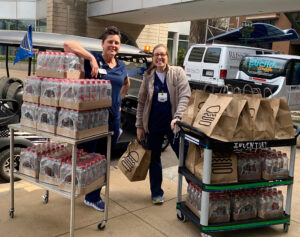
Washington University also is finding ways to support the local economy as businesses shutter and jobs disappear. First and foremost, university leaders have kept all of the university’s 16,500 employees and contractors on the payroll and honored the contracts of all contract workers.
“We understood that many businesses in our region would be forced to lay off workers and that those job cuts would ripple across the local economy,” said Henry S. Webber, executive vice chancellor and chief administrative officer. “We continue to do all we can to support our employees and their families.”
University faculty also are reaching out to help local organizations. For instance, Brown School faculty and staff are providing free professional development opportunities to local nonprofits.
In addition, the university donated $100,000 to the St. Louis Community Foundation, including $50,000 for the Regional Response Fund in support of local nonprofit organizations delivering services to people affected by the virus; and another $50,000 for the Gateway Resiliency Fund, which provides short-term monetary relief to employees and owners of businesses that are affected by closures and other circumstances related to COVID-19.
And Peter Boumgarden, professor of practice, strategy and organizations at Olin Business School, is helping restaurant owners understand the federal stimulus package.
And then there are the burgers. Washington University is purchasing more than 1,500 meals every week from gastro pubs, sandwich shops and ethnic eateries in the Delmar Loop and Central West End for employees at the School of Medicine, Facilities, Information Technology and the Washington University Police Department.
“St. Louis restaurants are among the best in the nation, and we’re doing our part to help them survive one to-go order at a time,” said Jodie Lloyd, senior analyst in the executive vice chancellor for administration’s office.
Keeping our community safe
When Washington University infectious disease and public health experts speak, regional leaders listen, especially Chancellor Martin. Washington University was among the first local institutions to institute remote working in mid-March and implement strict social distancing policies for those employees still deployed on campus.
The university’s Institute for Public Health also has been a vital resource for local officials as they try to make data-informed decisions about the region’s health. Researchers have developed a model to forecast the growth of cases and are studying the possible impacts of shelter-in-place policies on individuals vulnerable to domestic violence.
In addition, the Center for Community Health Partnership and Research is working with the St. Louis Department of Health, Immigrant Service Providers Network and BJC HealthCare to help immigrants understand and cope with the COVID-19 pandemic. Christopher Prater, MD, assistant professor of medicine and of pediatrics, said many immigrants have witnessed epidemics in their home countries to which St. Louisans can only now relate.
“It is very likely that their fear may be escalated because they have seen the disastrous effects of outbreaks in settings of limited medical resources,” said Prater, who has been a primary care physician for St. Louis’ immigrants and refugees for three years. “We cannot forget that many of our immigrant neighbors have seen deaths from diarrhea outbreaks, multi-drug resistant tuberculosis and measles.
“But worse yet,” Prater said, “they have perhaps seen loved ones die from pneumonia and lower respiratory tract infections, a leading cause of death globally, and the very reason why COVID-19 is causing mortality in 2020 in even the most heavily resourced medical systems.”
Helping where needed
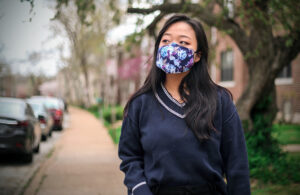
Washington University senior Han Ju Seo can’t treat COVID-19 patients or model the spread of the virus or write a big check to a local food pantry. But she can operate a sewing machine. So Seo bought fabric and thread and got to work sewing 1,000 masks for the St. Louis community.
“There was a moment when I decided that I could either eat ice cream and be sad that graduation was canceled or I could do something to help,” said Seo, who is majoring in psychology in Arts & Sciences. Seo said she was inspired by studies in positive psychology with Tim Bono, a lecturer in psychological and brain sciences and an assistant dean in Arts & Sciences.
Seo is just one of many students and alumni who have stepped up to serve the St. Louis community. Other students are helping St. Louis children as well as food-insecure and isolated seniors.
Lily Xu, a senior studying biomedical engineering at the McKelvey School of Engineering, and Alex Hu, a senior studying chemistry in Arts & Sciences, leveraged their experience with the Campus Y to launch Learning Lodge, which is offering online tutoring to local elementary and high school students. So far, some 70 Washington University undergraduates have joined their effort.
St. Louis-based alumni businesses also are serving local students. Varsity Tutors, founded by alumnus Chuck Cohn (BSBA ’08), launched a new service called Virtual School Day, which offers more than 20 hours of live, online classes across a variety of core subjects for K-12 students. And Gateway to the Great Outdoors (GGO), founded by WashU alumni Nadav Sprague (AB ’17, MPH ’20) and Ben Aiken (AB ’16), is providing free education kits consisting of urban agriculture and art-in-nature lesson plans.
And Harsh Moolani, who graduated in December with a degree in neuroscience in Arts & Sciences, is currently training 190 volunteers, including 80 Washington University students, through his platform Students to Seniors to conduct virtual visits via phone and computer tablets with residents of Friendship Village of Chesterfield, Sunrise of Chesterfield and Tower Grove Manor.
As an undergraduate, Moolani founded Create Circles, a nonprofit organization that strives to reduce social isolation and cognitive decay by pairing young volunteers with older adults in long-term care facilities to produce creative projects such as articles, videos and podcasts.
“We must protect the health and safety of older adults, but we must also guard their humanity and dignity,” Moolani said. “When you can’t eat with others, when everyone who you are in contact with is wearing a mask, when you can’t visit with your family and loved ones — that takes an enormous toll.”
Moolani tells his volunteers not to think of themselves as do-gooders offering companionship, but as pupils gaining wisdom and perspective.
“I encourage our volunteers to ask for advice and learn about their experiences,” Moolani said. “We live in a culture where our older adults are not valued, but now, more than ever, we all can benefit from their wisdom.”
Kristina Sauerwein, senior medical science writer, and Kelly Wiese Niemeyer, Record editor, contributed to this report.
WashU Response to COVID-19
Visit coronavirus.wustl.edu for the latest information about WashU updates and policies. See all stories related to COVID-19.
